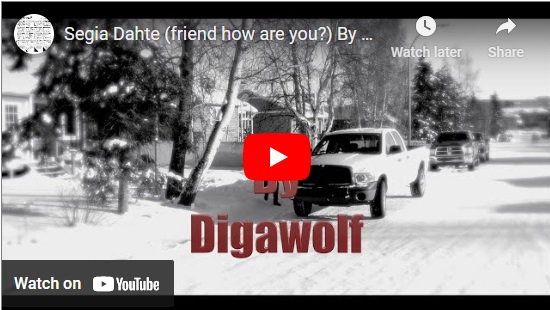It’s safe to assume that few artists appreciate the benefits of home recording more than Tlicho singer-songwriter Digawolf (born Jesse James Yatlayi). Deeply committed to remaining in his hometown of Yellowknife, NWT, the double JUNO Award nominee is keenly aware of the logistical and fiscal challenges of having to travel far afield to make an album.
The making of his 2009 LP Distant Morning Star entailed a lengthy stay in a Toronto studio, and 2019’s full-length Yellowstone – that earned him a JUNO nomination for Indigenous Artist or Group of the Year – was recorded in a barn in Denmark.
The just-released album Ini was primarily recorded in the basement studio of Digawolf’s home in the far North, reflecting his increased proficiency in DIY recording techniques. “There aren’t a lot of options when it comes to the North,” he says. “You have to wear many hats here. You can’t just call up a producer, engineer, or songwriter, and there aren’t many available musicians here, either.”
The project initially started as a collaboration with Toronto-based producer/DJ Jason Spanu. “The idea was to explore ideas and run them off each other, co-producing the full album,” says Digawolf. “We worked together on the tracks ‘Seiga Dahte’ and ‘Ehtsee,’ but then I kept working on the other tracks, using techniques Jason showed me for using Ableton [a digital audio workstation].”
Ini features adventurous, atmospheric sonic explorations, and songs that reflect upon Digawolf’s experience of living and working in Yellowknife. All of them are written in Tlicho, the language he spoke growing up in Behchoko, the capital of the Tlicho nation in Nunavut. “Part of me is really honoured that I can still speak the language, as I know there are many people losing their languages,” he says.
The ambience of the album evokes his surroundings. “The idea of trying to capture the essence of the North is something I always strive for, and hopefully I succeed from time to time,” says Digawolf. “I started off as a cartoonist and painter, and I still keep the paintbrush in the back of my head. I feel as if I still paint, but with audio now.”
Digawolf credits the classic Tom Waits album Rain Dogs for changing his life early on. “I was maybe 12 when I rescued that CD from the garbage,” he says. “Someone here was throwing it out, as he thought Tom sounded like the Cookie Monster, but I listened to it like crazy. I have five older brothers, and growing up I always followed what they were listening to. With Tom Waits, I finally found my own music. I still have to listen to that album when I’m starting a new project.”
Digawolf’s gruff voice and spoken-word vocal style often elicit comparisons to the likes of Waits, Leonard Cohen, and Robbie Robertson, while reference points for his sonically manipulated guitars include Daniel Lanois and Robert Fripp. Citing the former as a real inspiration, Digawolf expresses a desire to work with Lanois in the future.
Doubtless Lanois would be intrigued by Digawolf’s penchant for sonic experimentation with the guitar. “That was my first instrument, and I still love exploring new ideas and sounds on the guitar,” he says. “Trying to find the latest guitar pedal is rather an insane obsession. Right now I’m into the lap steel, using an e-bow on it with two fuzz pedals and using delay. You can hear that on [new track] ‘Ini.’”
Despite the challenges of life in the North, Digawolf is proud that he works on his home turf. “A long time ago, I thought about moving South, but the North is my home,” he says. “It’s a wonderful thing to be doing something you love, and be at home.”
